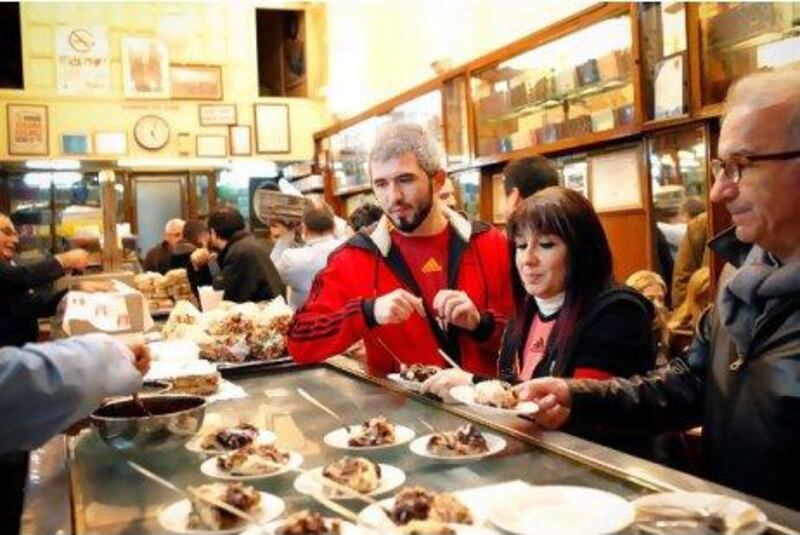ISTANBUL // One of Istanbul's most famous sweetshops may be facing a bitter future.
"My parents used to come here," Fatma Feriha Araytac, an elegant 53-year-old Istanbulite, said last week as she was enjoying a plate of profiterole, the trademark dish at Inci Pastanesi, a traditional and cramped pastry shop on Istiklal Caddesi, the main shopping street in central Istanbul. "This is our history," she said, looking around the room dominated by mirrors and a long glass counter and filled with a dozen customers.
Since it was founded in 1944, Inci has been known for its profiterole, globes of sweet dough filled with heavy cream and coated with a thick chocolate sauce, ingredients that are produced daily in a kitchen behind the shop. The restaurant's manager, Musa Ates, learned the trade from the founder, Lukas Zigoridis, when he started to work in the shop aged 12. He later took over the management of Inci, while the shop has remained the property of Mr Zigoridis' family.
Working with 16 assistants, Mr Ates, 65, said he spends more than 12 hours in the shop each day. "And I eat profiterole every day," he added with a chuckle.
He is not alone. Inci's reputation has grown over generations. Ms Araytac, the Inci customer, had brought Esra Gul, her future daughter-in-law, to introduce her to the Inci experience. "We have people from all over the world coming in here," Mr Ates said. Over the years, he launched several lawsuits to prevent other shops around Turkey from using the Inci name.
Ali Suat Tukel, another customer at Inci, recounted how people from provincial towns of Turkey used to have two destinations when they came to Istanbul for a visit: "They wanted to see the Bosphorus, and they wanted to eat profiterole at Inci."
But the legendary sweetshop could soon be forced to close. The multi-storey historic building that houses Inci, other shops and a well-known cinema owned by Emekli Sandigi, the pension fund of Turkey's civil servants, may be in for a complete makeover. The fund has leased the building to a construction company, which wants to turn the 19th-century building, known as Cercle d'Orient, into a shopping mall, according to news reports.
Preparations for construction have been halted by a court order for now, but Mr Ates said he was not sure how long his shop would be around. "This is wrong," he said about the plans. "All that we learn, we learn from our culture." He said the shop would not relocate, adding that once Inci was gone, "it will not come back".
Mr Ates had already been confronted with a demand to vacate the building when a court case brought by Istanbul's chamber of architects halted proceedings last year. The court case is still ongoing, with the next hearing scheduled for May 4.
As Istanbul benefits from Turkey's economic boom and attracts more and more tourists, the gentrification of some areas in the city centre has started.
Old buildings are being expensively renovated or torn down to make room for new ones.
Nowhere is that process fiercer than on Istiklal Caddesi, formerly known as Grande Rue de Pera, which used to be the home address of many European embassies and diplomats and is still at the heart of Beyoglu, Istanbul's theatre and nightclub district. The building next to the Cercle d'Orient on Istiklal Caddesi, hidden behind construction scaffolding, is another shopping mall in the making and already the subject of controversy. Prompted by news reports about an illegal addition of stories on the new building, state investigators were quoted as saying last year that some of the new stories would have to be torn down.
More than 3,000 buildings in the district have been renovated in the past five years, according to Ahmet Misbah Demircan, the mayor of Beyoglu. Mr Demircan has said he wants to design a future for the district "without forgetting the past", but he has not said what a renovation of the Cercle d'Orient would look like. There has been no comment from the construction company.
In the midst of the drive to modernise Istanbul, shops such as Inci represent a yearning for the good old times of an Istanbul before malls, fast-food restaurants and international coffee-shop chains. "It is sad," Ms Araytac said about Inci and the old Beyoglu atmosphere. "My uncle used to tell me how he would get a shave twice a day to be tidy, and he said no one went through Beyoglu without a tie."






